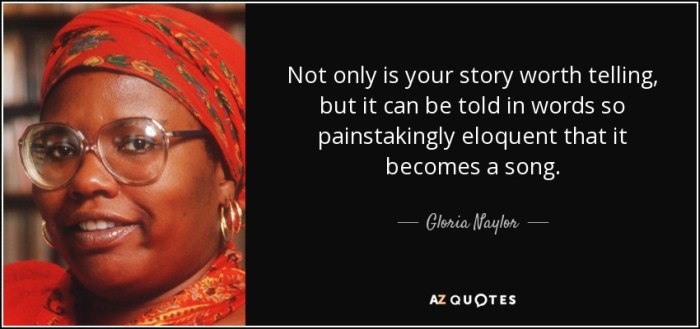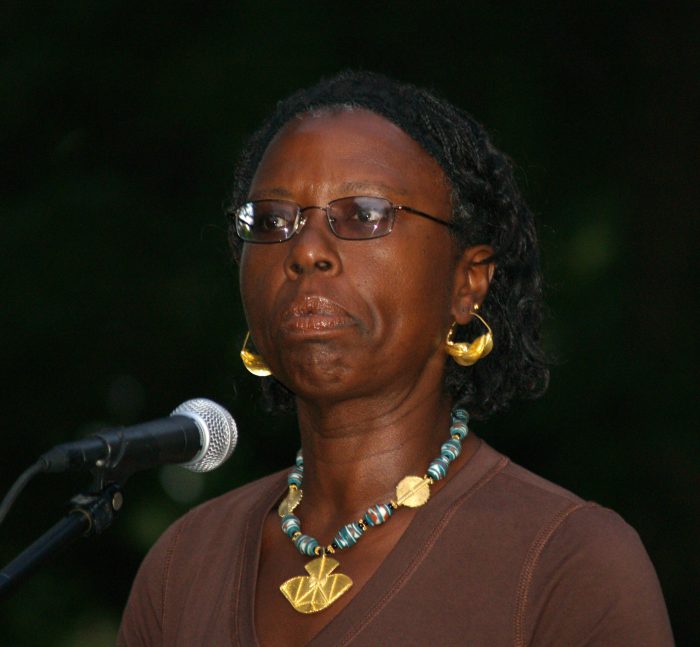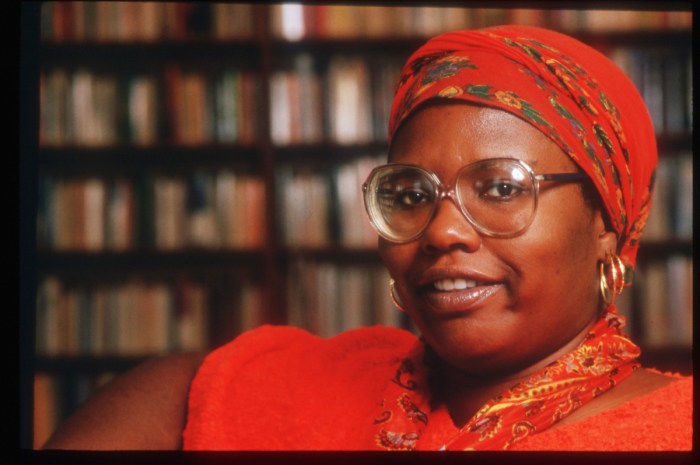Gloria naylor the meaning of a word – Gloria Naylor’s groundbreaking work in African American literature delves into the multifaceted significance of words, revealing their power to shape identities, empower individuals, and illuminate the search for meaning in life.
Through her unique writing style and evocative themes, Naylor invites readers to explore the intricate interplay between language and human experience, challenging the limitations of language and shedding light on the profound impact words can have on our lives.
Introduction

Gloria Naylor’s contributions to African American literature are profound and far-reaching. Her groundbreaking works explore the complexities of Black womanhood, identity, and the intersections of race, gender, and class in America.
Naylor’s writing style is distinctive, characterized by its lyrical prose, unflinching honesty, and keen observations on human nature. Her characters are often marginalized and voiceless, yet she imbues them with a dignity and strength that challenges societal norms.
Unique Themes
Naylor’s work delves into the following key themes:
- The search for identity:Naylor’s characters grapple with their racial, gender, and sexual identities in a society that often seeks to define and limit them.
- The resilience of Black women:Despite the challenges they face, Naylor’s female characters demonstrate remarkable strength, resilience, and determination.
- The power of storytelling:Naylor uses storytelling as a tool for empowerment and healing, giving voice to the experiences and struggles of marginalized communities.
The Meaning of a Word

Gloria Naylor’s use of the word “word” in her work is multifaceted and significant. It encompasses both the power and the limitations of language in shaping human experience and identity.
The Power of Language
Naylor depicts language as a tool that can empower individuals and communities. In her novel The Women of Brewster Place, the women use storytelling as a way to connect with each other, share their experiences, and find strength in their collective struggles.
The Limitations of Language
Naylor also explores the limitations of language. In her essay “The Meaning of a Word,” she argues that language often fails to capture the full complexity of human experience. She writes, “Words are not things, they are not even concepts.
They are signs that point to something else.” This idea is further explored in her novel Mama Day, where the protagonist, Ophelia, struggles to find the words to express her own identity and experiences.
Language and Identity
Naylor’s work also examines the relationship between language and identity. In her novel Linden Hills, the protagonist, Willa Prescott, grapples with the complexities of her racial and cultural identity. She struggles to find a language that can fully express her experiences as a black woman in America.
Conclusion
Through her exploration of the word “word,” Gloria Naylor sheds light on the power and limitations of language in shaping human experience and identity. Her work challenges us to think critically about the ways in which we use language and to recognize its potential for both empowerment and exclusion.
The Power of Words

Words possess immense power, capable of both empowering and disempowering individuals. Gloria Naylor’s work profoundly explores this dynamic, demonstrating how words can shape self-perception, influence societal interactions, and perpetuate or challenge systems of oppression.
Words can empower individuals by affirming their identity, validating their experiences, and fostering a sense of belonging. In The Women of Brewster Place, for instance, Naylor uses language to empower the marginalized women of Brewster Place. Through their shared stories and collective voice, they find strength and resilience in the face of adversity.
Words as Weapons, Gloria naylor the meaning of a word
Conversely, words can also be used as weapons to disempower and silence individuals. Naylor’s novel Linden Hillsexposes the ways in which language is employed to perpetuate racial prejudice and maintain social hierarchies. The residents of Linden Hills use derogatory terms and stereotypes to dehumanize and exclude their African American neighbors.
By analyzing the power of words, Naylor sheds light on the complex and multifaceted role language plays in shaping our lives. Her work encourages us to critically examine the language we use and its potential impact on others, fostering a greater awareness of the power and responsibility that comes with words.
The Limits of Language

Language is a powerful tool for communication, but it also has its limits. Sometimes, there are experiences or emotions that simply cannot be adequately expressed in words.
Gloria Naylor’s work explores the limits of language in a number of ways. In her novel The Women of Brewster Place, for example, she uses the character of Mattie Michael to represent the frustration and anger that many African-American women feel in the face of racism and sexism.
Mattie is a strong and independent woman, but she often finds herself unable to express her true feelings because the language she has been taught to use is inadequate.
The Power of Silence
In addition to using silence to explore the limits of language, Naylor also uses it to create a sense of mystery and suspense. In her novel Linden Hills, for example, the silence of the main character, Luther Nedeed, is used to create a sense of unease and uncertainty.
Luther is a young man who has been traumatized by his experiences in the Vietnam War, and he is unable to speak about his experiences to anyone. His silence creates a barrier between him and the other characters in the novel, and it makes it difficult for the reader to understand what he is thinking and feeling.
The Search for Meaning: Gloria Naylor The Meaning Of A Word

Gloria Naylor’s work is deeply engaged with the search for meaning in life. Her characters are often driven by a desire to find purpose and fulfillment in a world that can often feel chaotic and meaningless. Language plays a central role in this search, as it is through language that we express our thoughts, feelings, and desires.
Naylor’s characters often struggle to find the words to express their experiences. This can be due to a lack of vocabulary, a fear of being misunderstood, or a sense of shame. However, Naylor also shows that language can be a powerful tool for self-discovery and empowerment.
When her characters are able to find the words to express themselves, they are often able to find a sense of meaning and purpose in their lives.
The Power of Language
Naylor’s work demonstrates the power of language to shape our experiences. The words we use can create or destroy, build up or tear down. Naylor’s characters often use language to hurt others, but they also use it to heal and to create.
Naylor shows that language is a powerful tool that can be used for both good and evil.
The Limits of Language
However, Naylor also recognizes the limits of language. There are some things that cannot be expressed in words. These things are often the most important things in life, such as love, beauty, and spirituality. Naylor’s work shows that while language is a powerful tool, it is not the only tool we have for understanding the world.
Answers to Common Questions
What is the significance of Gloria Naylor’s work in African American literature?
Gloria Naylor’s work has been instrumental in shaping the landscape of African American literature, providing a voice to marginalized experiences and challenging traditional narratives.
How does Naylor use the word “word” in her work?
Naylor employs the word “word” in various ways, exploring its power to shape identities, empower individuals, and convey complex emotions and experiences.
What is the role of language in Naylor’s writing?
Language plays a pivotal role in Naylor’s work, serving as a tool for storytelling, self-expression, and social critique, while also acknowledging its limitations and complexities.